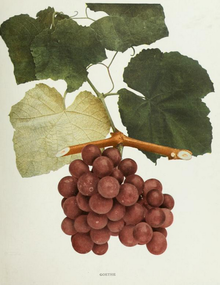Goethe (grape)
| Goethe | |
|---|---|
| Grape (Vitis) | |
 Illustration of Goethe grapes from the 1908 book The Grapes of New York | |
| Color of berry skin | Rose |
| Also called | Rogers No. 1 |
| Sex of flowers | Female |
| VIVC number | 4851 |
Goethe is one of the collection of grape varieties known as Rogers' Hybrids, created by Edward Staniford Rogers of Salem, Massachusetts, in the mid-19th century, and is the result of a cross of Carter, a selection of Vitis labrusca, and Black Hamburg (there are two varieties known by this name, but in this case it was probably Schiava Grossa), a selection of Vitis vinifera. It was originally known as Rogers No. 1, until Rogers named it after Johann Wolfgang Goethe, the German author, artist, and scientist.[1][2][3]
Goethe is female, and thus requires a second grape variety as a pollen source. Fruit is a pale red, ripens late, and is prone to rot. Hedrick considered it the most vinifera-like of the Rogers' Hybrids, but while of high quality, it rarely reaches full maturity in shorter-seasoned climates, and only achieved a measure of popularity in the Mid-Atlantic and Mid-West United States.
References
[edit]- ^ Hedrick, Ulysses Prentiss; Booth, Nathaniel Ogden (1908). The grapes of New York. Albany : J.B. Lyon Co., State printers. pp. 276–277.
- ^ Hedrick, U. P. (1919). Manual of American Grape-growing. Macmillan. p. 377.
- ^ Barnes, William H. (1901). The Grape in Kansas. state. p. 22.
